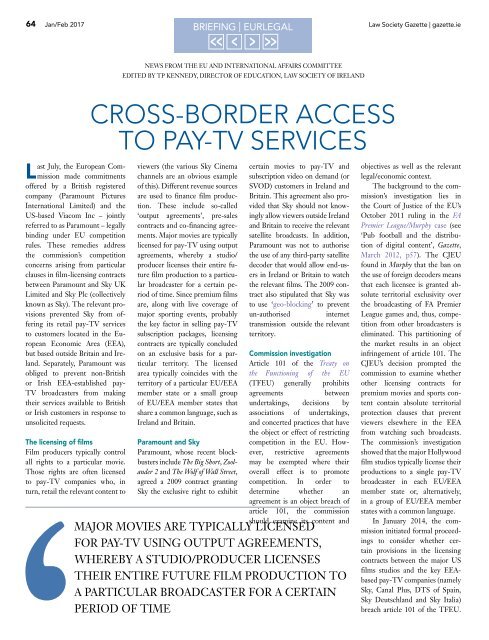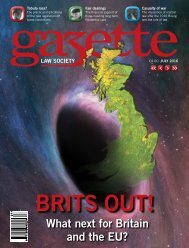ga ette
Jan-Feb-17-Gazette
Jan-Feb-17-Gazette
Create successful ePaper yourself
Turn your PDF publications into a flip-book with our unique Google optimized e-Paper software.
64 Jan/Feb 2017<br />
BRIEFING | EURLEGAL<br />
Law Society Gaz<strong>ette</strong> | <strong>ga</strong>z<strong>ette</strong>.ie<br />
NEWS FROM THE EU AND INTERNATIONAL AFFAIRS COMMITTEE<br />
EDITED BY TP KENNEDY, DIRECTOR OF EDUCATION, LAW SOCIETY OF IRELAND<br />
Last July, the European Commission<br />
made commitments<br />
offered by a British registered<br />
company (Paramount Pictures<br />
International Limited) and the<br />
US-based Viacom Inc – jointly<br />
referred to as Paramount – le<strong>ga</strong>lly<br />
binding under EU competition<br />
rules. These remedies address<br />
the commission’s competition<br />
concerns arising from particular<br />
clauses in film-licensing contracts<br />
between Paramount and Sky UK<br />
Limited and Sky Plc (collectively<br />
known as Sky). The relevant provisions<br />
prevented Sky from offering<br />
its retail pay-TV services<br />
to customers located in the European<br />
Economic Area (EEA),<br />
but based outside Britain and Ireland.<br />
Separately, Paramount was<br />
obliged to prevent non-British<br />
or Irish EEA-established pay-<br />
TV broadcasters from making<br />
their services available to British<br />
or Irish customers in response to<br />
unsolicited requests.<br />
The licensing of films<br />
Film producers typically control<br />
all rights to a particular movie.<br />
Those rights are often licensed<br />
to pay-TV companies who, in<br />
turn, retail the relevant content to<br />
CROSS-BORDER ACCESS<br />
TO PAY-TV SERVICES<br />
viewers (the various Sky Cinema<br />
channels are an obvious example<br />
of this). Different revenue sources<br />
are used to finance film production.<br />
These include so-called<br />
‘output agreements’, pre-sales<br />
contracts and co-financing agreements.<br />
Major movies are typically<br />
licensed for pay-TV using output<br />
agreements, whereby a studio/<br />
producer licenses their entire future<br />
film production to a particular<br />
broadcaster for a certain period<br />
of time. Since premium films<br />
are, along with live coverage of<br />
major sporting events, probably<br />
the key factor in selling pay-TV<br />
subscription packages, licensing<br />
contracts are typically concluded<br />
on an exclusive basis for a particular<br />
territory. The licensed<br />
area typically coincides with the<br />
territory of a particular EU/EEA<br />
member state or a small group<br />
of EU/EEA member states that<br />
share a common language, such as<br />
Ireland and Britain.<br />
Paramount and Sky<br />
Paramount, whose recent blockbusters<br />
include The Big Short, Zoolander<br />
2 and The Wolf of Wall Street,<br />
agreed a 2009 contract granting<br />
Sky the exclusive right to exhibit<br />
certain movies to pay-TV and<br />
subscription video on demand (or<br />
SVOD) customers in Ireland and<br />
Britain. This agreement also provided<br />
that Sky should not knowingly<br />
allow viewers outside Ireland<br />
and Britain to receive the relevant<br />
satellite broadcasts. In addition,<br />
Paramount was not to authorise<br />
the use of any third-party satellite<br />
decoder that would allow end-users<br />
in Ireland or Britain to watch<br />
the relevant films. The 2009 contract<br />
also stipulated that Sky was<br />
to use ‘geo-blocking’ to prevent<br />
un-authorised<br />
internet<br />
transmission outside the relevant<br />
territory.<br />
Commission investi<strong>ga</strong>tion<br />
Article 101 of the Treaty on<br />
the Functioning of the EU<br />
(TFEU) generally prohibits<br />
agreements<br />
between<br />
undertakings, decisions by<br />
associations of undertakings,<br />
and concerted practices that have<br />
the object or effect of restricting<br />
competition in the EU. However,<br />
restrictive agreements<br />
may be exempted where their<br />
overall effect is to promote<br />
competition. In order to<br />
determine whether an<br />
agreement is an object breach of<br />
article 101, the commission<br />
should examine its content and<br />
MAJOR MOVIES ARE TYPICALLY LICENSED<br />
FOR PAY-TV USING OUTPUT AGREEMENTS,<br />
WHEREBY A STUDIO/PRODUCER LICENSES<br />
THEIR ENTIRE FUTURE FILM PRODUCTION TO<br />
A PARTICULAR BROADCASTER FOR A CERTAIN<br />
PERIOD OF TIME<br />
objectives as well as the relevant<br />
le<strong>ga</strong>l/economic context.<br />
The background to the commission’s<br />
investi<strong>ga</strong>tion lies in<br />
the Court of Justice of the EU’s<br />
October 2011 ruling in the FA<br />
Premier League/Murphy case (see<br />
‘Pub football and the distribution<br />
of digital content’, Gaz<strong>ette</strong>,<br />
March 2012, p57). The CJEU<br />
found in Murphy that the ban on<br />
the use of foreign decoders means<br />
that each licensee is granted absolute<br />
territorial exclusivity over<br />
the broadcasting of FA Premier<br />
League <strong>ga</strong>mes and, thus, competition<br />
from other broadcasters is<br />
eliminated. This partitioning of<br />
the market results in an object<br />
infringement of article 101. The<br />
CJEU’s decision prompted the<br />
commission to examine whether<br />
other licensing contracts for<br />
premium movies and sports content<br />
contain absolute territorial<br />
protection clauses that prevent<br />
viewers elsewhere in the EEA<br />
from watching such broadcasts.<br />
The commission’s investi<strong>ga</strong>tion<br />
showed that the major Hollywood<br />
film studios typically license their<br />
productions to a single pay-TV<br />
broadcaster in each EU/EEA<br />
member state or, alternatively,<br />
in a group of EU/EEA member<br />
states with a common language.<br />
In January 2014, the commission<br />
initiated formal proceedings<br />
to consider whether certain<br />
provisions in the licensing<br />
contracts between the major US<br />
films studios and the key EEAbased<br />
pay-TV companies (namely<br />
Sky, Canal Plus, DTS of Spain,<br />
Sky Deutschland and Sky Italia)<br />
breach article 101 of the TFEU.



